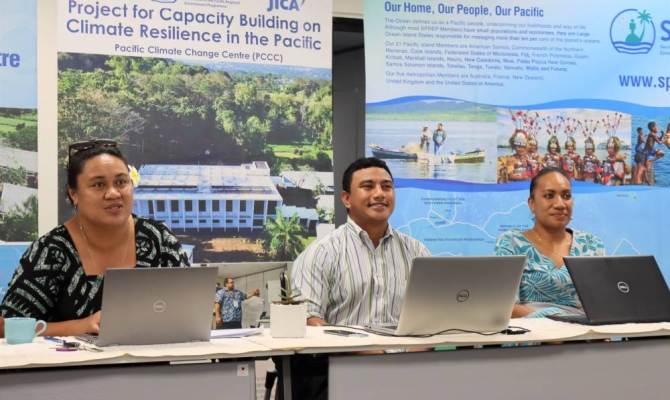
The Secretariat for the Pacific Regional Environment Programme (SPREP) through the Environmental Monitoring and Governance (EMG) Programme carried out an Environmental Impact Assessment (EIA) capacity building workshop for the staff of the Department of Mines from the Ministry of Mines, Energy and Rural Electrification (MMERE). The workshop was also attended by the staff of the Environment and Conservation Division (ECD) of the Ministry of Environment, Climate Change, Disaster Management, and Meteorology (MECDM).
In his opening remarks at the training workshop, the Permanent Secretary for the Ministry of Mines, Dr Chris Vehe highlighted the importance of strengthening national capacity in the EIA process, “The objective of the training is to raise the capacity of participants on the EIA process but also for the Department of Mines and the Environment and Conservation Division to develop synergies for a robust assessment process for mines in order to protect the natural environment, culture and prosperity of the Solomon Islands and its people. it is very important that after the training we should be re-assured of any forecasted adversaries in mine development that it will be managed cooperatively and cross-sectoral at the start of any mine development because of the strengthened capacity in EIA skillsets attained by officials in this training.”
The EIA process is a principal instrument to support the achievement of sustainable development goals through a systematic process that assesses potential environmental and social impacts of development projects.
The EIA training was conducted by Mr Jope Davetanivalu, Environment Planning Adviser, and Dr Greg Barbara, Environmental Assessment and Planning Officer, with support from the Pacific Learning Partnership-Environment Social Safeguards (PLP-ESS) partner World Bank represented by mines specialist, Ms. Rosie Davey.
Participants learnt the key aspects of the EIA process which include screening, scoping, review of EIA reports and setting of approval conditions. References were made to the Solomon Islands’ EIA guidelines and SPREP Regional EIA Guidelines as key resources for the training.
World Bank presented on the World Bank’s Environmental Social Framework, Mitigation Hierarchy, Risk Assessment and mitigation planning, Mine Closure and Rehabilitation and Gender Based Violence.
The workshop included a field visit to two mine sites including the Gold Ridge tailings dam to look at legacy mining issues and discuss the risks of reopening the Gold Ridge mine, and to an alluvial gold mining operation using mechanical sieving and washing rather than chemical extraction. The field visit was the opportunity for participants to apply principles from the training in identifying key risks and impacts on site as well as to discuss mitigation measures and ways forward.
Mr. Allen Kisi Ofea, the Principal Environment Officer for Environment and Conservation Division said the EIA training was very helpful in increasing his knowledge and confidence in carrying out his EIA responsibilities. “I have learned a lot from the discussions although I am quiet during the discussions. The reason I am quiet is because of my personal observations and disappointment on the gaps in enforcing the current Acts. However, since it was a training I have been enlightened and see the positives in moving forward while identifying the gaps and see how we can collaboratively address the issues.”
The Solomon Islands Mines and Minerals Act 1990 specifies a requirement to conduct an environmental assessment as part of the mining license approval process. Both the Environment Act 1998 and Mines and Minerals Act 1990 are currently under review and the two Ministries are eager for the two Acts and mining approval processes s to align with the EIA process.
The measures undertaken by the Solomon Island Government to improve the EIA process and polices within the two respective Ministries aligns well with article 13 of the Noumea Convention on preventing, controlling and reducing environment damages from mining activities.
SPREP is the premier environmental regional organisation in the Pacific responsible for delivering EIA capacity-building and providing policy advice, technical assistance and training to its Member countries in the region
The EIA capacity training was held at the Department of Mining of MMERE from 28 October – 1 November, 2019.
For more information on EIA, contact Jope Davetanivalu, Environmental Planning Adviser( [email protected]) or Gregory Barbara, Environmental Assessment and Planning Officer ([email protected]).